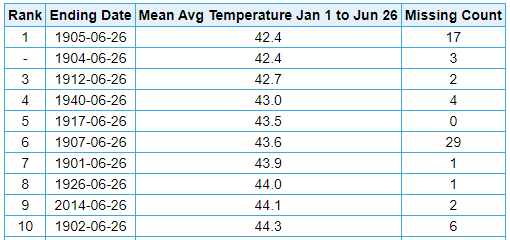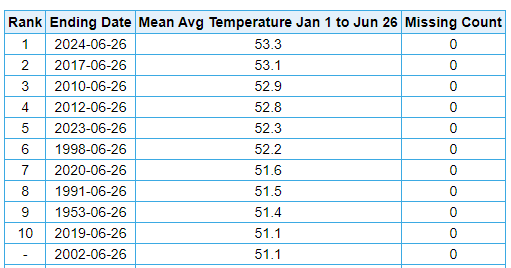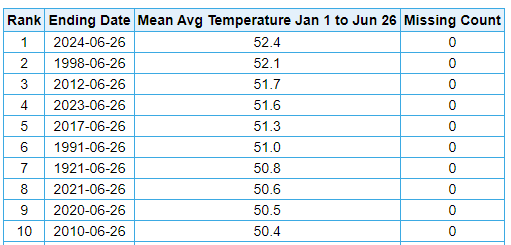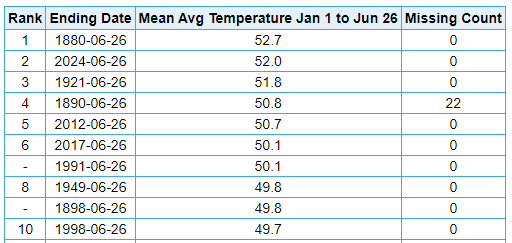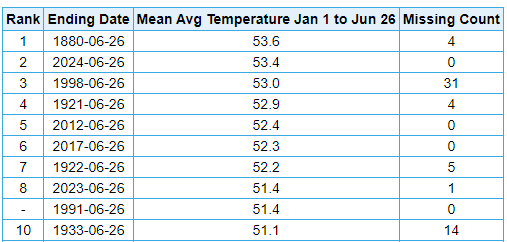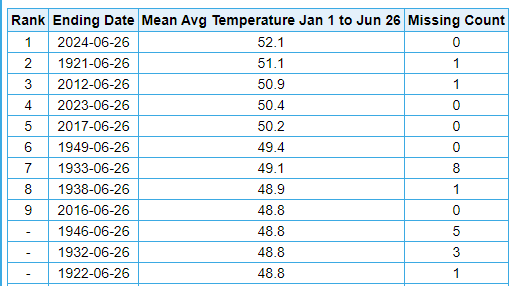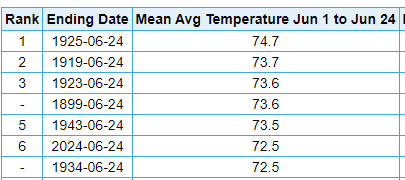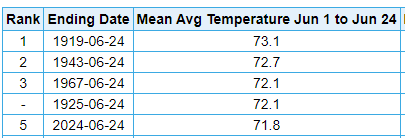
TheClimateChanger
Members-
Posts
4,376 -
Joined
-
Last visited
Content Type
Profiles
Blogs
Forums
American Weather
Media Demo
Store
Gallery
Everything posted by TheClimateChanger
-
Occasional Thoughts on Climate Change
TheClimateChanger replied to donsutherland1's topic in Climate Change
So what is the significance of this data? While NOAA continues to downplay the warming, we can see in fact that temperatures 100 years ago were routinely 8-10F cooler than the temperatures observed in 2024. The temperatures observed in this region in 2024 are more typical of 20th century East Tennessee (lower elevations). In fact, if we key in on Knoxville, Tennessee, for the period 1872-1996 (125 years), what we discover is this: 9 years [all on or before 1985] had a mean temperature at or below 52.1F. 34 years had a mean temperature of 53.4F or lower. 59 years had a mean temperature of 54.6F or lower. Turning instead to Tri-Cities, Tennessee [Bristol/Johnson City Area]... and I know the elevation here is a bit higher, but only by like 200-300 feet compared to the airports I showed in the Upper Ohio Valley. In fact, the elevation gain here is comparable to the elevation loss in comparing those locations to Knoxville and less than the elevation gain in the threaded records for those very locations. Anyways from 1938-2016, a period of 79 years, we find the following: 44 years had a mean temperature at or below 52.1F. 67 years had a mean temperature at or below 53.4F. All but 4 years had a mean temperature at or below 54.6F. -
Occasional Thoughts on Climate Change
TheClimateChanger replied to donsutherland1's topic in Climate Change
Very similar conditions can be noted in south central Pennsylvania, at locations like Hagerstown, Maryland [just across the state line] and Harrisburg/Middleton Area, Pennsylvania. Hagerstown, Md. Harrisburg/Middleton, Pa. -
Occasional Thoughts on Climate Change
TheClimateChanger replied to donsutherland1's topic in Climate Change
As we approach the half-way point of 2024, I figured it would be a good time to review the weather and past climate. Anyone who has followed me since the 1990s knows that I have consistently been the most accurate voice on climate change - even back to when I was but a wee lad of ten years. So far, everything is playing out largely as I had projected. For western Pennsylvania, this has undoubtedly been the hottest year on record to date. At Pittsburgh International Airport, the mean temperature has been 52.0F. In the threaded record, only 1880 is warmer. However, this was at the downtown city office - sited about 400' lower in elevation than the airport, and is not a reliable reading [as with most of the 19th century data in the threaded record]. From 1953-1979, the city office averaged 2.6F warmer than the suburban airport, with an annual range of +1.1F to +3.8F. Therefore, we can surmise that the mean temperature in downtown Pittsburgh is near 54.6F, with a high confidence interval of 53.1F to 55.8F. At Morgantown, West Virginia, the mean temperature has been 53.4F. Second to 1880, but Morgantown's records from that era also appear to suffer from a substantial warm bias. What is fascinating to me is 1998 is missing the entire month of March, and 2024 is still nearly a half degree Fahrenheit warmer! If you were alive in 1998, you can recall how it was a HUGE deal how warm it was in so many places. So to see this El Nino just completely blowing that away - even excluding a winter month - is incredible. At Wheeling, West Virginia, the mean temperature has been 52.1F, which is 1F above 1921. No data in this station thread 1954-1998, although only 1998 & 1991 would be warm year candidates. Worth noting the pre-1954 records were taken from a location adjacent to the Ohio River (at an elevation of less than 700 feet ASL, while the modern records are at the airport with an elevation of 1200 feet ASL). -
E PA/NJ/DE Summer 2024 Obs/Discussion
TheClimateChanger replied to JTA66's topic in Philadelphia Region
What is the annual mean temperature to date looking like on all of your devices? You should add a year-to-date temperature summary. -
Pittsburgh, Pa Summer 2024 Thread.
TheClimateChanger replied to meatwad's topic in Upstate New York/Pennsylvania
-
Pittsburgh, Pa Summer 2024 Thread.
TheClimateChanger replied to meatwad's topic in Upstate New York/Pennsylvania
-
Pittsburgh, Pa Summer 2024 Thread.
TheClimateChanger replied to meatwad's topic in Upstate New York/Pennsylvania
Severe Weather Statement National Weather Service Pittsburgh PA 731 PM EDT Wed Jun 26 2024 PAC003-270000- /O.CON.KPBZ.TO.W.0025.000000T0000Z-240627T0000Z/ Allegheny PA- 731 PM EDT Wed Jun 26 2024 ...TORNADO WARNING REMAINS IN EFFECT UNTIL 8 PM EDT FOR CENTRAL ALLEGHENY COUNTY... At 731 PM EDT, severe thunderstorms capable of producing both tornadoes and extensive straight line wind damage were located over Imperial, or 7 miles south of Moon Township, moving east at 40 mph. HAZARD...Tornado. SOURCE...Radar indicated rotation. IMPACT...Flying debris will be dangerous to those caught without shelter. Mobile homes will be damaged or destroyed. Damage to roofs, windows and vehicles will occur. Tree damage is likely. Locations impacted include... Pittsburgh, Penn Hills, Mount Lebanon, West Mifflin, North Side Pittsburgh, Baldwin, Scott Township, Wilkinsburg, Robinson Township, Munhall, Brentwood, Swissvale, Dormont, Carnegie, Crafton, Green Tree, Mount Oliver, Ingram, Homestead and Edgewood. PRECAUTIONARY/PREPAREDNESS ACTIONS... Move to an interior room on the lowest floor of a well-built building away from windows. If you are outdoors, in a mobile home, or in a vehicle, move to the closest substantial shelter and protect yourself from flying debris. && LAT...LON 4043 8028 4047 7988 4038 7989 4040 8026 TIME...MOT...LOC 2328Z 272DEG 33KT 4042 8029 TORNADO...RADAR INDICATED MAX HAIL SIZE...0.00 IN $$ Bookbinder -
Occasional Thoughts on Climate Change
TheClimateChanger replied to donsutherland1's topic in Climate Change
What's interesting is, unlike many months, in many cases, it has been many decades since these longer POR stations had a warmer June. 1994, 1967, 1943, 1925 & 1919 show up a lot on the list of warm Junes in the commonwealth. -
Occasional Thoughts on Climate Change
TheClimateChanger replied to donsutherland1's topic in Climate Change
NWS has 98 as the forecast high for downtown Atlanta and KATL. I believe that forecast is for downtown Atlanta. Actually, comparing the two point-click forecasts, KATL is the same or a degree warmer every period. -
Occasional Thoughts on Climate Change
TheClimateChanger replied to donsutherland1's topic in Climate Change
Interesting. It looks warmer than the IEM estimate, but I'm not sure what data they are drawing off of that... also, the inclusion of May 31 data (7 am) draws it down a bit relative to a 24-hour day. Guess we'll have to wait and see what NCEI shows. Of course, most of the record warm sites have short PORs. But I'd still say the first order climate sites would suggest a top 10 warm June, and probably top 5. -
Occasional Thoughts on Climate Change
TheClimateChanger replied to donsutherland1's topic in Climate Change
Also, for the urban heat enthusiasts, find the so-called UHI in this set of data. We have one very large city, surrounded by rural areas and small. Urban heat theory would say the city is the hottest spot by far. For the record: I don't doubt UHI exists, this is for the bozos who say it's the cause of the warming and way overplay its impact - especially on trend. Like UHI warms the local environment relative to forests or farmland [mostly w.r.t. overnight lows], but it doesn't cause a never-ending warming trend. Or start warming areas outside of the city and/or oceans. That makes zero sense. If you listen to some of these bozos, the city should be 10F+ warmer. -
Occasional Thoughts on Climate Change
TheClimateChanger replied to donsutherland1's topic in Climate Change
Ah, interesting. Looks like it's doing an excellent job today as well, with widespread temperatures already between 95 & 100. Dewpoints have dropped back into the 50s in most areas, already see a couple of 40s showing up (KWRB - 99/49; and KOPN 93/41). Might even see some Tds drop into the 30s if this keeps up. Must be a big relief for those of you in the southeast to see those kinds of dewpoints at this time of the year. -
Occasional Thoughts on Climate Change
TheClimateChanger replied to donsutherland1's topic in Climate Change
If anything, NOAA consistently underplays how much warming has taken place. Just look at this map, and then compare it to the actual rankings of the various first order climate sites. This discrepancy grows more each and every year. And it has nothing to do with UHI, because the trend is the same for rural sites. Every site in the state of Pennsylvania is having a top 10 warmest June, with the exception maybe of Pittsburgh. I think it's top 12, but that's heavily influenced by the fact that the downtown station was nearly 500' lower in elevation. Plus, it goes back to 1874, not 1893 as this map. Several locations are near their warmest Junes on record. Yet NOAA claims it's not been warm at all. Top 15-25 - which is where they have most of the state - is not warm in this era. No idea what data they are looking at. -
Central Pa. Summer 2024
TheClimateChanger replied to mahantango#1's topic in Upstate New York/Pennsylvania
- 6,666 replies
-
Pittsburgh, Pa Summer 2024 Thread.
TheClimateChanger replied to meatwad's topic in Upstate New York/Pennsylvania
It could be SPC that’s asleep at the wheel. -
Pittsburgh, Pa Summer 2024 Thread.
TheClimateChanger replied to meatwad's topic in Upstate New York/Pennsylvania
Rare to see them trot out the "t" word, especially with SPC not even giving us a 2% chance. -
Pittsburgh, Pa Summer 2024 Thread.
TheClimateChanger replied to meatwad's topic in Upstate New York/Pennsylvania
Rest Of Today Partly sunny late this morning, then mostly cloudy with scattered thunderstorms this afternoon. Some thunderstorms may be severe with damaging winds, small hail, heavy rainfall, and tornadoes. Highs in the mid 80s. Southwest winds 10 to 15 mph. Chance of precipitation 50 percent. Tonight Considerable cloudiness. Thunderstorms and showers likely in the evening, then a slight chance of showers and thunderstorms after midnight. Patchy fog. Some thunderstorms may produce damaging winds, small hail, heavy rainfall, and tornadoes in the evening. Humid with lows in the lower 60s. Northwest winds 10 to 15 mph, becoming west around 5 mph after midnight. Chance of rain 70 percent. -
Looking like some very comfortable dews in the 50s today for the District.
-
Occasional Thoughts on Climate Change
TheClimateChanger replied to donsutherland1's topic in Climate Change
Nice graphic. This depicts exactly what I had said months ago. I know it's not all of the stations, but you've picked a pretty representative 5-site sample, and demonstrated how every station could have a defined warming trend within a certain time frame but the average of all available stations can show a fake cooling trend if warmer stations are replaced over time by cooler ones [or even if simply more "cooler" stations are added to the station mix over time]. -
Occasional Thoughts on Climate Change
TheClimateChanger replied to donsutherland1's topic in Climate Change
And it looks like dewpoints did in fact drop into the 40s and 50s, at least in the places I looked at. Good work by the HRRR! -
Occasional Thoughts on Climate Change
TheClimateChanger replied to donsutherland1's topic in Climate Change
Looks like the models did pretty well. Lots of triple digits. I saw a cousin was in Birmingham and posted a picture of his car thermometer reading 110! -
Occasional Thoughts on Climate Change
TheClimateChanger replied to donsutherland1's topic in Climate Change
-
Central Pa. Summer 2024
TheClimateChanger replied to mahantango#1's topic in Upstate New York/Pennsylvania
Very solid numbers statewide, with many locations in the midst of their warmest June in many decades. Harrisburg [3rd warmest to date, warmest since 1943] Williamsport [6th warmest to date, warmest since 1943] Hagerstown, Maryland [just over the border] [3rd warmest to date] Bradford [shorter POR - 1958] [warmest to date] Dubois [shorter POR - 1963] [2nd warmest to date, behind 1967] Scranton/Wilkes-Barre Area [5th warmest, warmest since 1967]- 6,666 replies
-
Central Pa. Summer 2024
TheClimateChanger replied to mahantango#1's topic in Upstate New York/Pennsylvania
I guess it depends on the level of rarity you wish to achieve. There have been 13 of those at MDT since 2000 - or a little more frequent than once every other year. 5 days of 90+ would be a little more than once every year. But either is better than the traditional 3 days of 90+.- 6,666 replies
-
Central Pa. Summer 2024
TheClimateChanger replied to mahantango#1's topic in Upstate New York/Pennsylvania
There's a fine line between rare and climatologically impossible.- 6,666 replies

